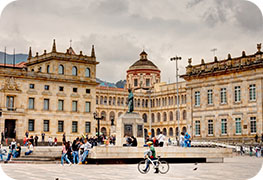Everything you need to know about a Colombia Visa
 Colombian
immigration authorities allow visa-free entry to British nationals for stays of
up to 90 days as a visitor.
Colombian
immigration authorities allow visa-free entry to British nationals for stays of
up to 90 days as a visitor.
However, upon arrival, the authorities at the
airport will stamp your passport with the granted stay period, which may vary,
depending on your purpose of travel.
You
should carry your British citizen passport that is valid for a minimum of six
months and you might be asked to present proof of return or onward travel. You
should also carry proof of sufficient funds to cover your stay in Colombia.
If
you enter the nation with a Colombian visa, which is valid for more than 90
days, you have to complete a registration process at the Migración Colombia
office or online within 15 days of entering the country.
You
can also extend your granted stay period in Colombia by up to a maximum span of
120 days by lodging an application via the immigration office Migración
Colombia.
Note that if you are only for visiting purposes, you cannot stay in
Colombia for more than 180 days within any 12 month period. Overstaying this
limit can lead to fines and deportation.
Holders
of dual British-Colombian passports must arrive in and exit from Colombia,
using only the Colombian passport and Colombian identification card (Cedula).
For
land travel, please ensure that your passport is stamped by the appropriate
immigration authorities. Otherwise, you may have to pay a hefty fine.
Entry requirements for foreigners
In order to check if you need a visa to enter Colombia, please visit thislink. Just enter your nationality and passport type and you will get your answer.
Now, if you do need a visa, you can take note of the primary visa types offered by the Colombian government:
Visitor Visa
A visitor visa or a type V visa is available in single and multiple entries and allows travel to Colombia for a temporary stay. It is issued as a transit visa, tourist visa, business visa, or student visa.
You can also use it to go for academic exchange, to conduct research related to art or trades, to attend graduate courses, to receive medical treatment, to partake in administrative and/or judicial procedures.
Visit visas are additionally issued to the boat or coastal platform crews, or to individuals who undertake residencies or internships, volunteering, audiovisual and/or digital production, journalism, temporary services, intra-corporate personnel transfers within the authorized network of international organizations, foreign government commercial representations, official trips, vacation purposes, or employment programs.
In order to apply for a visit visa, you will need:
- A passport that is valid for at least six months and has sufficient blank pages for visa stamping
- A completed electronic visa application form
- A recent passport-size photograph
Since the application is online, you do not need any additional documents. But you should enquire with the Colombian Embassy in London about what other supporting documents you might need.
Any of these forms should not be older than three months, must be apostilled, and should have legalized Spanish translations.
Bank statements may be excluded from this requirement. In some cases, you might also have to submit criminal records in the form of a criminal background certification.
Resident Visa
A resident or R visa is required when you decide to seek permanent residency in Colombia. This might be because of any of these scenarios - you had previously renounced your Colombian nationality, you are the parent of a Colombian national by birth, you have stayed long enough to seek the status of permanence, or you are involved in foreign direct investment.
Migrant Visa
A migrant visa or M visa is applicable when a foreigner wishes to visit Colombia and stay here in the long-term but he/she is not eligible for a type R visa.
This visa can be issued to a spouse or permanent companion of a Colombian national, parent or child of Colombian national by adoption, a migrant who falls under the Mercosur Agreement, refugees, job seekers, businessperson, independent workers, religious visitors, elementary, middle, and undergraduate students, real estate investors, retired people, or landlords.
Entry rules for minors
Minors below 18 years, who are recognized as residents of Colombia and who have a British passport, need to carry written permission when exiting alone from the nation. The parent(s) must issue this letter, granting approval, and this must be notarized by the appropriate authority or the Colombian Consulate.
The letter must include details such as the next destination, purpose of the visit, exit, and entry dates.
Yellow fever certificate requirements
The government of Colombia follows the International Health Regulations, under which travelers above one year must produce a yellow fever certificate if arriving from Angola, Brazil, the Democratic Republic of the Congo, and Uganda.
It is also required for travelers who have transited for more than 12 hours through an airport of a country with risk of yellow fever transmission.
UK Emergency Travel Documents
Colombian immigration officers accept UK Emergency Travel Documents (ETDs) at ports of entry, airside transit, and exit, provided the ETD is valid for at least six months from the date of arrival in Colombia.
Additional points
During your stay in Colombia, if you plan to visit the Islands of San Andres, Providencia or Santa Catalina, you must buy a tourist card from the airport you are traveling from.
This card is always available at the boarding gate. If your visit is less than 24 hours and you have kids under seven years accompanying you, you do not need this card.
Departure tax is usually included in your ticket price. Note that you can carry cash of only up to US$10,000 when you enter or exit Colombia. If you carry more than this amount in cash, in USD or equivalent currency, the money may be confiscated at the airport.